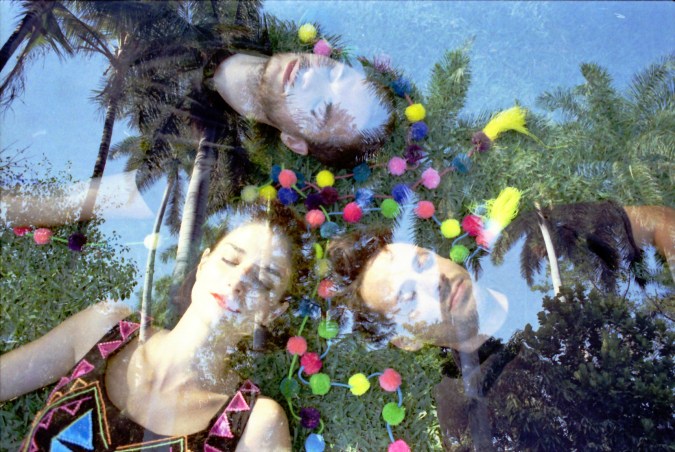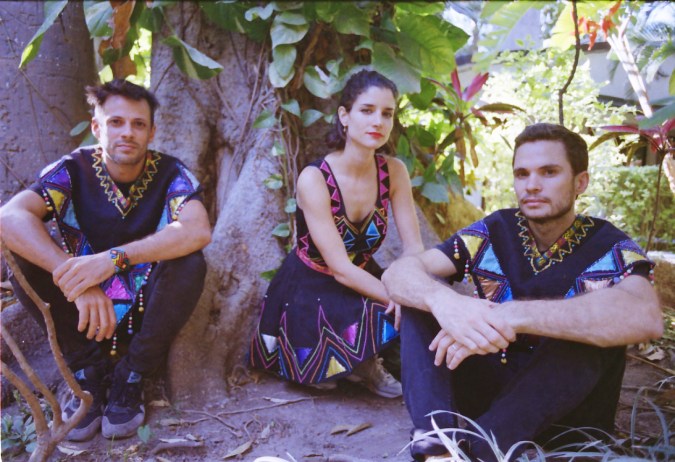Pedro Canale, the Argentine musician better known as Chancha Via Circuito, got his start hawking merch in the back of the room at the formative Buenos Aires club night Zizek. A decade later, don’t expect to find the 36-year-old Canale burning the midnight oil.
“Our preference is for daytime outdoor shows in the open air,” he tells Remezcla via Skype from a European tour. “If it has to be in a club, then in an ideal world, not too late.”
Perhaps it’s something about syncing his music with the diurnal cycle. “Mostly because of age,” he says, laughing. “At midnight, we’re tired. I’ll be 37 in August and I don’t have the same energy as in my youth.”
But with age comes wisdom, as evidenced by Canale’s fourth full-length release, the wondrous Bienaventuranza (“Bliss”) that drops June 8 via Wonderwheel Recordings. It’s a joyous album that sees the taciturn producer further refine a sui generis aesthetic that has helped stamp a sound steeped in folklore and brewed with electronics emanating from places like Buenos Aires and Quito on labels like ZZK and AYA.


Arguably, no one is more responsible than Canale for pushing forward this sound, originally the cumbia digital that caught the underground electronic music scene by storm in the mid- to late 2000s. His momentous sophomore album Río Arriba was a radical departure from the dance floor impulses that sought to make nostalgic cumbia into something new and hip.
Many artists followed that wave, but few evolved the way Canale has.
“I went through mutations and saw the same with other musician peers who came up through the explosion of digital cumbia on the ZZK label 10 years ago,” he observes. “It’s interesting to see how things can remain fresh because no one is attached to following a formula.”

In his case, propulsive cumbia rhythms have taken a backseat to other Andean folkloric sounds. On Bienaventuranza, Canale dabbles in huayno, the highland music that’s rich with strings and brass and has roots in Quechua communities in Bolivia and Peru. It’s also the ceremonial music for Northern Argentine carnival, the source of the googly-eyed llama that peers back from the album’s cover.
Ensconced in his studio for the four years since 2014’s Amansara, Canale brought in a bevy of instruments for the 12 tracks on Bienaventuranza: charango, flute, bombo legüero, caxixi, djembe, and balafon, to name a few. On the handful of vocal tracks, fellow digital folklore practitioners, like Ecuador’s Mateo Kingman and Colombian-Canadian artist Lido Pimienta lend their voices.
On stage, Canale plays charango and flute, his wife Kaleema sings, and porteño percussionist Federico Estevez keeps time on various drums. Lately, they’ve been getting a curiously odd number of bookings at psytrance festivals, which is not exactly Canale’s favorite genre.

“It causes brain damage,” he deadpans. “But I think people like us because they can relax a bit in the midst of so much insanity.”
Indeed, the West Coast festival scene has warmly embraced Canale. For one, Canale is looking forward to a relaxing weekend at the Beloved Festival on the Oregon coast in August.
“It’s a more hippie festival,” he says. “Almost no one drinks alcohol, just mushrooms and marijuana.”
That’s precisely the vibe Chancha Via Circuito thrives in. “Daytime festivals in forests are the best, surrounded by nature,” he says. Unsurprising for an artist who relies heavily on birdsong in his sampling repertoire.
In a previous interview, Canale self-identified with the boy playing the flute at the foot of a glacier-capped volcano on the cover of Río Arriba. Reflecting on who he is now, he says, “I’m still that same colorful boy playing the flute,” he assures. “Just a little bit older.”
Chancha via Circuito’s Bienaventuranza drops June 8 via Wonderwheel Recordings.




